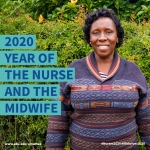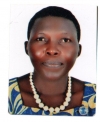Joseph Lutaakome
ID: UNCST-2020-R008323
|
A Multicenter, Adaptive, Randomized, Blinded Controlled Trial of the Safety and Efficacy of Investigational Therapeutics for Hospitalized Patients with COVID-19
REFNo: HS1099ES
SARS-CoV-2 is a novel coronavirus causing COVID-19 and has spread very rapidly. Safe and effective treatments are urgently needed. One antiviral treatment, remdesivir, and an anti-inflammatory drug, dexamethasone, have shown benefit; these are now the COVID-19 standard-of-care treatment for in patients in many parts of the world. The structure of the natural antibodies that hasten recovery from COVID-19 are now known; this means synthetic forms have been manufactured. These synthetic neutralising monoclonal antibodies (nMAb) ‘neutralise’ the virus by binding to it and prevent it from entering cells in the body, including the lungs. By giving an infusion of these nMAb(s) in addition to COVID-19 standard-of-care treatment, we hope hospitalised patients will recover more quickly.
The primary endpoint of TICO is to test whether in hospitalized adults with confirmed COVID-19 infection, the nMAb(s) result in more people with ‘sustained’ recovery i.e. discharged from hospital, alive, and home for 14 consecutive days by Day 90.
1) For everyone enrolled during stage 1 and 2 of the trial the secondary research questions are to define, the numbers of deaths through 90 days of follow-up; the number of people who experience sustained recovery over 90 days, the time to discharge from the initial hospital, and the number of days alive up to day 90.
2) Changes in the scores to assess people’s lung and respiratory function on Days 1-7, and Days 14 and 28.
3) Changes between Day 0 and Day 5 in the National Early Warning (NEW) score, this is a scoring system validated in the UK, which is able to score how sick people are, and their risk of dying, based on things like their blood pressure, pulse rate and body temperature.
4) Clinical organ failure defined by development of any one or more of the following through Day 28
a. Respiratory system dysfunction including the need for oxygen therapy or ventilation
b. Cardiac problems include heart attacks and heart failure
c. Low blood pressure requiring drug support to maintain it
d. kidney dysfunction including needing dialysis
e. liver dysfunction including liver failure and abnormal liver tests
f. Brain and nerve problems including acute confusion, strokes, brain swelling, meningitis, and weakness of the legs
g. Blood problems including major bleeding
h. thrombotic events in the veins or arteries
i. Serious infections including sepsis.
5) Safety and tolerability as measured by: grade 3 and 4 clinical adverse events, serious adverse events, or death through Day 5 and through Day 28; Infusion-related reactions of any severity and the percentage of participants for whom the infusion was interrupted or stopped prior to completion.
6) Change in the levels and types of antibodies against COVID-19, from baseline to Days 1, 3, 5 and 28 and 90.
|
Uganda |
2020-12-18 |
2023-12-18 |
Medical and Health Sciences |
|
Non-degree Award |

|
Patrick Wakida
ID:
|
MARKET RESEARCH STUDY TO UNDERSTAND THE MARKET POTENTIAL FOR CANCER TESTING EQUIPMENT IN UGANDA
REFNo: SS679ES
i. To understand current diagnostic and treatment pathways in breast cancer.
ii. To gain an understanding of breast cancer management including mapping diagnostic and treatment pathways
iii. To understand the processes and challenges of penetrating the invitro diagnostics products market the Uganda.
iv. To determine the need for molecular invitro diagnostics product In Uganda
|
Uganda |
2020-12-18 |
2023-12-18 |
Social Science and Humanities |
|
Non-degree Award |

|
Nelson Sewankambo K
ID: UNCST-2020-R014578
|
Feasibility and acceptability of Dialog+ in Primary care-Uganda
REFNo: HS1116ES
i. test the feasibility and acceptability of DIALOG+ for patients with non-communicable physical health conditions in primary care
ii. explore the adaption of Dialog+ intervention through a process of stakeholder consultation and refine the training materials to promote wider implementation and upscale
iii. explore the effect of using the adapted Dialog+ intervention on patient outcomes
|
Uganda |
2020-12-18 |
2023-12-18 |
Medical and Health Sciences |
|
Non-degree Award |

|
Catherine Mwesigwa
ID: UNCST-2019-R000988
|
FEASIBILITY OF INTEGRATING ORAL HEALTH IN THE PRIMARY CARE OF HIV PEDIATRIC PATIENTS IN KAMPALA, UGANDA
REFNo: HS1055ES
1. To determine the factors that influence integrating oral health at pediatric HIV care facilities.
2. To assess the effectiveness of an oral health education intervention in pediatric HIV care.
3. To explore the feasibility of integrating oral health within primary HIV-care in a low-resource setting
|
Uganda |
2020-12-17 |
2023-12-17 |
Medical and Health Sciences |
|
Non-degree Award |

|
Nazarius Tumwesigye Mbona
ID: UNCST-2019-R000664
|
Research Protocol for the Impact and Economic Evaluation of Health Systems Strengthening Interventions in the West Nile region of Uganda
REFNo: HS1110ES
To determine the status and associated factors (i. DHSS intervention, ii. Quality of Care, iii. SBCC) of coverage of maternal and child health and nutrition services in intervention and counterfactual districts during 2019
2: To determine the status and associated factors (i. DHSS intervention, ii. Quality of Care, iii. SBCC) of use of maternal and child health and nutrition services in intervention and counterfactual districts during 2019
3: To determine the differences and the associated factors (i. DHSS intervention, ii. Quality of Care, iii. SBCC) of the change in coverage of maternal and child health and nutrition services from 2019 to 2024 between intervention and counterfactual districts
4: To determine the differences and the associated factors (i. DHSS intervention, ii. Quality of Care, iii. SBCC) of the change in use of maternal and child health and nutrition services from 2019 to 2024 between intervention and counterfactual districts
5: To establish the cost and effectiveness of DHSS, quality improvement and SBCC in the use and coverage of maternal and child health and nutrition services from 2019-2024
|
Uganda |
2020-12-17 |
2023-12-17 |
Medical and Health Sciences |
|
Non-degree Award |

|
Grace Kaisa Tibagwa
ID:
|
Analysing routine patient data collected through the LifeHealth Network for trends of clinical and public health importance
REFNo: HS1007ES
To analyse data of patients with infectious diseases (such as malaria, HIV, TB), non-communicable diseases (such as cancer, diabetes) and serious health conditions (such as sickle cell anaemia) subscribing to the LifeHealth model for any trends of clinical and public health importance.
|
Uganda |
2020-12-16 |
2023-12-16 |
Medical and Health Sciences |
|
Non-degree Award |

|
Viola Nyakato Nilah
ID: UNCST-2021-R013698
|
Sexual and reproductive health and wellbeing during COVID-19: A study protocol for online national surveys and global comparative analyses
REFNo: SS560ES
The overall goal of this global study is to better understand sexual and reproductive health among adults during COVID-19 using an online convenience sample from 23 countries. The primary study aims are listed below:
1) To determine the impact of COVID-19 social restriction measures on sexual health, with a focus on safe sex practices
2) To determine the impact of COVID-19 social restriction measures on domestic violence, with a focus on gender-based violence
3) To determine the impact of COVID-19 social restriction measures on access to essential reproductive health commodities and services, including contraceptives, abortion, maternal health services
Secondary study aims including the following:
1) To determine the impact of COVID-19 social restriction measures on mental health
2) To determine the impact of COVID-19 social restriction measures on harmful cultural practices
3) To determine the impact of COVID-19 social restriction measures on STI and HIV/AIDS testing and treatment
4) To determine the impact of COVID-19 social restriction measures on nutrition
|
Uganda |
2020-12-16 |
2023-12-16 |
Social Science and Humanities |
|
Non-degree Award |

|
Musa Sekikubo
ID: UNCST-2020-R014404
|
Understanding COVID-19 in pregnant women and their babies in Uganda
REFNo: HS913ES
Primary objectives
• To describe the seroepidemiology of COVID-19 among pregnant women in Uganda
• To assess the risk of COVID-19 in newborn infants born to pregnant women with confirmed or probable COVID-19 and determine possible routes of mother-to-child transmission
• Secondary objectives
• To determine the clinical course and pregnancy outcomes in women infected with SARS-CoV-2 during pregnancy
• To determine the presence of SARS-CoV-2 in various mother and baby samples (serum, throat and nasal swabs, vaginal swab, placenta swabs and biopsies, and breast milk) and estimate the duration of viral excretion
• To assess the immune responses to SARS-CoV-2 in pregnant women and their babies
• To work with communities to understand perceptions surrounding infection prevention and control techniques to reduce the spread of COVID-19 amongst the pregnant population
|
Uganda |
2020-12-16 |
2023-12-16 |
Medical and Health Sciences |
|
Non-degree Award |

|
Mark Jordans
ID: UNCST-2020-R014861
|
Quasi-experimental study of a group-based psychosocial support intervention (movement-based activities “TeamUpâ€) for children affected by conflict and adversity in Uganda
REFNo: HS941ES
The aim of this quasi-experimental study is to evaluate the outcomes of the TeamUp intervention for children aged 10-14 years attending community primary schools, compared to a standard of care.
|
Netherlands |
2020-12-16 |
2023-12-16 |
Medical and Health Sciences |
|
Degree Award |

|
Jolly Beyeza-Kashesya
ID:
|
mHealth for Improvement of Access to Maternal Health Services in the Era of Covid-19 Pandemic (SMS Maama Project)
REFNo: HS1076ES
Primary objective:
Assess whether a mHealth platform increases maternal health knowledge in the areas of birth preparedness, pregnancy and birth complications as measured by the pre- and post- survey.
Secondary objectives:
1. To provide knowledge of COVID-19 symptoms, transmission, diagnosis, and treatment, in a time of social distancing and learn
2. To improve access and linkages to maternal health services and information as well as provide appropriate referrals for pregnant women.
3. To inform the adoption of mHealth into future health delivery plans.
|
Uganda |
2020-12-16 |
2023-12-16 |
Medical and Health Sciences |
|
Non-degree Award |

|
Rawlance Ndejjo
ID: UNCST-2022-R010993
|
Sustainable health and multisectoral collaborations in Uganda in the COVID-19 response and post-recovery period
REFNo: HS1107ES
• To explore perspectives of key stakeholders around sustainable health and multisectoral collaborations in Uganda in the context of COVID-19 and post-COVID-19 recovery period.
• To establish the gaps around sustainable health and multisectoral collaborations in Uganda in the context of COVID-19 and post-COVID-19 recovery period.
• To explore the opportunities around sustainable health and multisectoral collaborations in Uganda in the context of COVID-19 and post-COVID-19 recovery period.
• To identify the needs around sustainable health and multisectoral collaborations in Uganda in the context of COVID-19 and post-COVID-19 recovery period.
|
Uganda |
2020-12-16 |
2023-12-16 |
Medical and Health Sciences |
|
Non-degree Award |

|
Fred Kyeyune
ID:
|
Development of Assays for Mass screening of Sars Cov-2 infections in communities
REFNo: HS1114ES
1:To develop and optimize highly sensitive assays (index assays) for mass screening of Sars Cov-2: two types of assays will be developed: 1) assays that improve the limit of detection (LOD) of Sars Cov-2 by LAMP, q PCR and Next Generation sequencing assays 2) Low cost sequence specific assay for testing of Sars Cov-2 vrius
2: To perform a comparative analysis of the above assays to the Gold standard
assay for detection of Sars Cov-2.
Aim 3: To assess the index assays and gold standard assays for mass screening of Sars Cov-2 infections.
|
Uganda |
2020-12-16 |
2023-12-16 |
Medical and Health Sciences |
|
Non-degree Award |

|
Mary Grace Nakate Nakate
ID:
|
Experience of Social Isolation and social distancing for Women and significant others in the Family on Continuity of Care in the First 1000 days of life During the COVID 19 Pandemic in Mbale Uganda.
Version:
REFNo: HS675ES
To explore the experiences of social isolation and distancing for women on continuity of care in the first 1000 days of life during the COVID 19 pandemic at Bunghokho-Mutoto Sub-county. Mbale, District.
To describe the experiences of social isolation and distancing for women’s significant others in the family on continuity of care in the first 1000 days of life during the COVID 19 pandemic at Bunghokho-Motto, Mbale District.
|
Uganda |
2020-12-15 |
2023-12-15 |
Medical and Health Sciences |
|
Non-degree Award |

|
Adeline Boatin
ID: UNCST-2019-R001255
|
Caesarean delivery in Uganda: a mixed methods study
REFNo: HS758ES
1. To use survey methods to explore practice patterns of clinicians around caesarean usage in Uganda.
2. To use qualitative methods to explore practice patterns of clinicians and clinical policy makers around caesarean usage in Uganda
3. To describe CS rates, factors associated with CS and maternal and neonatal outcomes according to Robson group classification at Regional Referral Hospitals and large private non-profit hospitals in Uganda
|
Ghana |
2020-12-15 |
2023-12-15 |
Medical and Health Sciences |
|
Non-degree Award |

|
Dickens Akena Howard
ID: UNCST-2019-R000179
|
Integration of mental health care in communities affected by the COVID-19 pandemic - A cluster randomized trial of 24 villages in central Uganda
REFNo: HS1009ES
Our objectives will include: (a) Documenting MHL, PD, MDD, GAD, PTSD and SUD levels in the study population, (b) Determining the effectiveness of a psycho-education intervention delivered by village health team (VHT) members on study outcomes, (c) Determining the cost and cost effectiveness of delivering a psycho-education intervention, and (d) linking individuals in need of mental health care with the MOH psychosocial teams.
|
Uganda |
2020-12-15 |
2023-12-15 |
Medical and Health Sciences |
|
Non-degree Award |

|
Annet Namugaya Waibi
ID:
|
Pedagogical approaches of English Language curriculum on learners outcome in public secondary schools in Iganga District.
REFNo: SS578ES
1. To establish ways in which the content expertise for English Language teachers defines student learning outcomes in public secondary schools in Iganga District.
2. To map out the significance of instructional design skills by English language teachers on students learning outcomes in public secondary schools in Iganga District.
3. To determine the implications of English language teachers assessment techniques on student's learning outcome in public secondary schools in Iganga District.
4. To ascertain the contributions of classroom management by English language teachers on students learning outcomes in public secondary schools in Iganga District.
|
Uganda |
2020-12-11 |
2023-12-11 |
Social Science and Humanities |
|
Degree Award |

|
Conrad Muzoora Kihembe
ID: UNCST-2019-R001432
|
Intensified tuberculosis treatment to reduce the mortality of HIV-infected and uninfected
patients with tuberculosis meningitis: a Phase III Randomized Controlled Trial. ANRS 12398
INTENSE-TBM
REFNo: HS804ES
The Primary objective is to assess the efficacy of two interventions to reduce mortality from TBM in adolescent and adults with or without HIV co-infection in sub-Saharan Africa:
• Intensified TBM treatment, compared to WHO standard TBM treatment
• Aspirin compared to not receiving Aspirin (placebo).
|
Uganda |
2020-12-10 |
2023-12-10 |
Medical and Health Sciences |
|
Non-degree Award |

|
Irene Among Among
ID:
|
A Gender, youth and social inclusion analysis of Pathfinder’s family planning program in Kyegegwa, Kyenjojo, Kibaale, Kyankwanzi, Buliisa, Ntoroko, Bundibugyo, Kiryandongo, Gomba, Rakai and Butambala districts
REFNo: SS646ES
1. To identify the vulnerable/marginalized/underserved and hard-to-reach population segments in the FPA catchment districts.
2. To define the systemic barriers faced by such population segments in accessing SRH/FP information and services, structured around the six domains of USAID’s gender analysis framework - access, beliefs, practices, time/space, rights, and power.
3. To make recommendations on innovative approaches that the FPA could take to address barriers and improve access to quality reproductive health services and adoption of positive reproductive health behaviors.
4. With precision to gender and youth, to provide further recommendations as appropriate, on innovative strategies based on local needs, to mainstream gender and youth programming into national/district health planning by detailing specific gender-focused and youth-focused activities for each result area of the project.
|
Uganda |
2020-12-10 |
2023-12-10 |
Social Science and Humanities |
|
Non-degree Award |

|
Lawrence Mugisha
ID:
|
MONITORING OF DISEASES AND ANTIMICROBIAL USE IN POULTRY FARMING BY USE OF INFORMATION AND COMMUNICATION TECHNOLOGY TO CONTROL ANTIMICROBIAL RESISTANCE (AMR) IN WAKISO DISTRICT; UGANDA
REFNo: A100ES
The overall objective of the project is to provide an ICT framework for improved monitoring and control of AMU and AMR in poultry farmers in Wakiso District, Uganda.
Specific objectives
• To perform a stakeholder analysis in order to establish all players in poultry farming systems in Wakiso District
• To examine practices, attitudes, knowledge and behavior of poultry farmers in Wakiso District
• To collect data on poultry diseases, access and use of antibiotics in Wakiso district
• To develop and deploy an ICT platform to monitor AMU, AMR and disease prevalence’s in poultry in Wakiso District
• To examine the role of ICT in the implementation and management of Poultry projects in Wakiso District
|
Uganda |
2020-12-09 |
2023-12-09 |
Agricultural Sciences |
|
Non-degree Award |

|
Haruna Muwonge
ID: UNCST-2019-R000128
|
SUPPLEMENTS, HERBS AND DOPING PRODUCTS USAGE AMONG UGANDAN ATHLETES AND COACHES
REFNo: SS507ES
1. To evaluate supplement and herbal product usage amongst athletes from all major sporting codes in Uganda
2. To evaluate the usage of doping substances or methods amongst Ugandan athletes from all major sporting codes.
3. To determine the existing framework for intervening in herbal products usage among athletes and support personnel in Uganda
4. To examine the existence of anti-drug abuse interventions targeting the misuse of herbal products among Ugandan athletes and support personnel.
5. To determine the level of susceptibility to doping agent usage among Ugandan athletes and suggest recommendations for an intervention.
|
Uganda |
2020-12-08 |
2023-12-08 |
Social Science and Humanities |
|
Non-degree Award |

|
| View |
|
Sort By: |
|
|
|
| |
|